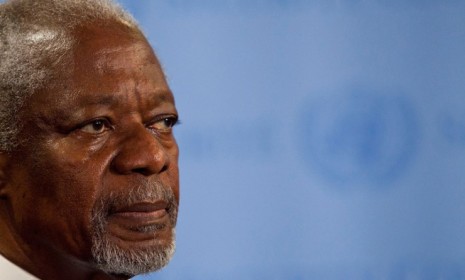Kofi Annan quits on Syria: Is diplomacy dead?
The venerable statesman and envoy to Syria throws up his hands in frustration, all but guaranteeing that the bloody conflict will be settled on the battlefield

A free daily email with the biggest news stories of the day – and the best features from TheWeek.com
You are now subscribed
Your newsletter sign-up was successful
Kofi Annan's quest for Syrian peace always seemed like "mission impossible." And now, exasperated by his lack of progress in resolving Syria's unrelenting civil war, Annan has resigned as the special envoy of the United Nations and the Arab League. Annan did not go quietly, blasting the international community for failing to unite against the government of Syrian President Bashar al-Assad and the rebels he's battling. (Russia and China have opposed U.N. Security Council resolutions that would have threatened sanctions if Syria did not abide by Annan's peace plan.) U.N. Secretary General Ban Ki Moon says he's trying to replace Annan, but it's unlikely Ban will find anyone with the same international stature as the Nobel laureate. Does diplomacy have a chance in Syria?
Get ready for a protracted civil war: Annan's resignation is a "landmark moment" that "marks the end of diplomacy in Syria," says Britain's The Guardian in an editorial. Russia and China are standing by Assad, while the U.S. and its allies have failed to convince the opposition "to accept any element of the existing regime as part of the transitional process." The standoff means the two sides will duke it out on the battlefield, with no guarantee that one is strong enough to defeat the other. "Everyone is digging in for a longer and bloodier war."
The Week
Escape your echo chamber. Get the facts behind the news, plus analysis from multiple perspectives.

Sign up for The Week's Free Newsletters
From our morning news briefing to a weekly Good News Newsletter, get the best of The Week delivered directly to your inbox.
From our morning news briefing to a weekly Good News Newsletter, get the best of The Week delivered directly to your inbox.
Annan's resignation shows diplomacy's flaws: Annan's failure perpetuates the belief that diplomatic efforts are "marked by impotence and inability to create breakthroughs in difficult conflicts," says Adam Chandler at Tablet. Annan's tenure as U.N. secretary general was marked by similar failings, from the genocide in Rwanda to peacekeeping efforts in Bosnia. In fact, Annan's diplomacy gave the Syrian regime "a few shreds of international legitimacy and dangerous cover that Assad used to continue his brutal crackdown on the opposition (as well as killing civilians and torturing children)."
"Kofi Annan's unnecessary resignation"
But U.S. diplomacy may still play a role in Syria: "With the Kofi Annan diplomatic charade played out, pressures will mount for the United States to head off a wider civil war in Syria," says Leslie H. Gelb at The Daily Beast. Of course, military intervention would only suck the U.S. into an intractable conflict. Instead, the U.S. should use its diplomatic clout to convince Syria's neighbors — Jordan, Turkey, Saudi Arabia, and Qatar — to increase their involvement and smooth the way for a new government. The Syrian civil war is "the perfect case where the United States can lead only from behind, where it can help others to understand what they should and should not do, and fill in the blanks."
"Kofi Annan's exit: Why Obama should lead from behind in Syria"
A free daily email with the biggest news stories of the day – and the best features from TheWeek.com
-
 Political cartoons for February 22
Political cartoons for February 22Cartoons Sunday’s political cartoons include Black history month, bloodsuckers, and more
-
 The mystery of flight MH370
The mystery of flight MH370The Explainer In 2014, the passenger plane vanished without trace. Twelve years on, a new operation is under way to find the wreckage of the doomed airliner
-
 5 royally funny cartoons about the former prince Andrew’s arrest
5 royally funny cartoons about the former prince Andrew’s arrestCartoons Artists take on falling from grace, kingly manners, and more